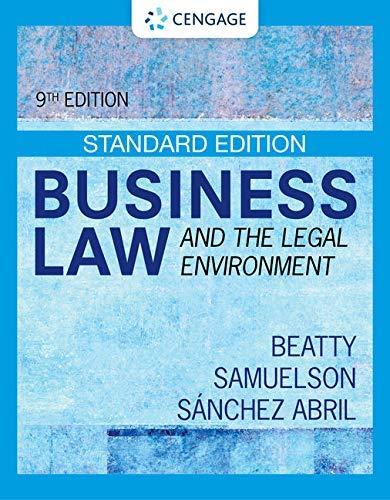Question
I have just completed my CRJ 151 White Collar Crime course that introduce us to a variety of white-collar crime issues, including definitional complexities, the
I have just completed my CRJ 151 White Collar Crime course that introduce us to a variety of white-collar crime issues, including definitional complexities, the causes, frequency and impact of economic crime, and victim and offender profiles. Governmental corruption, organization fraud, consumer and environmental offenses, anti-trust violations, and international schemes will be covered. Students will also become familiar with the methods used to investigate, prosecute and sentence white-collar offenders. Policy considerations will be discussed for controlling national and international white-collar crime.
By the end of the course, we were able to:
- Be able to define white-collar crime, distinguish it from other types of crime and be familiar with the difficulty in measuring the occurrence of these offenses and their associated costs.
- Understand the types of conduct constituting white-collar offenses by exploring various historical precedents.
- Be familiar with various theories for the causes of white-collar crime on both the individual and organizational levels.
- Analyze the complexities of investigating and prosecuting white-collar offenders by examining hypothetical fraud and corruption schemes.
- Understand the far-ranging impact of white-collar crime, particularly with reference to globalization, international monetary markets, and state-corporate complicity in illegal conduct.
- Describe various policy and legislative initiatives for combating white-collar crime and the resulting ethical considerations flowing from the initiatives.
Summarize the course
Discuss your familiarity with financial knowledge, literacy, and scams before this course and any changes as a result of this course and the materials assigned ( I really had no knowledge)
(4) Discuss consumer fraud is the most important to educate others aboutandwhy you think this is the most vital information to share with the public.
References:
- Jennifer C. Noble,White-Collar and Financial Crimes: A Casebook of Fraudsters, Scam Artists, and Corporate Thieves(University of California Press, 2021) (ISBN 9780520302891)
- Martina Dove,The Psychology of Fraud, Persuasion and Scam Techniques: Understanding What Makes Us Vulnerable(Routledge, 2021) (ISBN9780367859565)
Step by Step Solution
There are 3 Steps involved in it
Step: 1

Get Instant Access to Expert-Tailored Solutions
See step-by-step solutions with expert insights and AI powered tools for academic success
Step: 2

Step: 3

Ace Your Homework with AI
Get the answers you need in no time with our AI-driven, step-by-step assistance
Get Started


